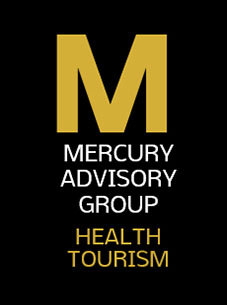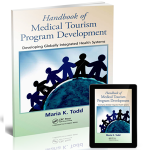[vc_row][vc_column width=”1/4″][vc_column_text] [/vc_column_text][vc_column_text]
[/vc_column_text][vc_column_text]
…This is what is missing from most medical tourism marketing around the world. The hospitals position the hospital as “the attraction or expert”. It isn’t. A hospital is a real estate commodity if the medical staff and nursing team cannot convince the patient that they are the experts worthy of patient trust.
[/vc_column_text][vc_column_text]
Maria Todd covers these health and wellness tourism referral and business development mastery techniques in the Handbook of Medical Tourism Program Development, published by CRC |Productivity Press. Copies are available at from the publisher or at Amazon.com or in our e-store
CRC Press, a premier global publisher of scientific, technical, and medical content, provides essential material for academics, professionals, and students. CRC Press products include world-class references, handbooks, and textbooks as well as the award-winning CRCnetBASE eBook collections. CRC Press is a member of Taylor & Francis Group, an informa business.[/vc_column_text][/vc_column][vc_column width=”3/4″][vc_column_text]
By definition, an expert has specialized skill and ability. As an expert in health and wellness tourism business development, I know what I am doing, what needs to be done and how to guide doctors, clinics and hospitals and their executives on what needs to be done to secure a positive outcome. But I am not an expert in everything. So, to be a leader with expert power, I had to identify what I am an expert in, what I needed to become expert in, and what I wanted to become an expert in. I also needed to know what I don’t know, so that I could bring in other experts when I need them. This is also true for you.
Expert power starts with an inventory of one’s current skills and expertise.
Create a table similar to the one below. The goal of the exercise is to identify market leadership roles where you will be the most successful.
| Area of Expertise | Credentials | Promotion Strategy | |||
| Experience | Education | Awards | Other | ||
| Your chosen niche | example | example | example | example | How will you describe or demonstrate it to others? |
When one has made the effort to become an expert, it is only fair that one receives recognition for their expertise. If your physicians have a professional qualification in a medical or wellness tourism discipline, or if your doctors have held a high-ranking position, or if they have worked for a very successful teaching hospital, university, research institute, or if they have been honored with a prestigious award, then people should know this.
Be particularly mindful of how you present and defend your expertise. There’s a delicate balance between bragging and informing, and what is appropriate in one culture (and the medical advertising laws in one’s home country) may not be appropriate in another. So, whatever you do to promote your image of expertise must be done in moderation. For instance, hanging an award certificate in your office, posting it on your website, or writing articles for professional journals press, may be good ways to show your expertise. Reminding people at every chance you get that you went to medical school – and that you sell medical tourism…not so good.
I remember one consultant with whom I worked on a project with a client. When he ran out of things to say to defend a point for a strategy he was recommending, he adamantly stated “I have an MBA!” as if that conferred some type of special authority. I thought it was such an odd thing to say to a client as a defense of a strategy he was attempting to persuade the client to follow. Then I realized, he was in his fifties, but he had only graduated from the MBA program a few years before. When the client pushed back and said “So do many others I could ask for assistance, but what makes you such an expert that I should trust your recommendation?” I was thankful that he wasn’t my employee. That moment would have been in his final hour of employment. Firing people while on a project is such an awful responsibility of leadership, but that error was as egregious as a doctor about to risk injury to a patient by recommending a surgery that he wasn’t qualified to recommend or perform. The other firm kept him on because they sent him out there alone without a mentor or a senior to monitor his interactions with a client. I see that as a boon for me as their competitor.
Now replace “I have an MBA” with “I have a medical license.” If you are not promoting the expertise of your medical staff actively and using their charisma and referent power, why should others trust your consultant physicians and surgeons as the world-class expert? If you say nothing to promote the informal power they possess in a health or wellness tourism market niche, then the sign on the wall says “They have a medical license” and not much more. The same is true when you say “We are accredited.” Accreditation no longer effectively sets you apart from the thousands of other hospitals that are licensed and accredited by some ISQua-accredited surveyor. It takes much more than that to establish that power.
In essence, that’s what your competitors are saying to the market if all they do is establish a health or wellness tourism service line that gives patients their a cheaper price, a hotel room, airport pickup and blah, blah, blah amenities that everyone else in medical tourism markets these days.
To build your expertise and differentiate your brand of quality healthcare within your chosen market niche, you’ll need to master three sources of informal power:
- Charismatic power – power that comes from a the surgeon’s natural charm and charisma (the entire team must demonstrate charisma to be able to seem affable and approachable, or people won’t choose your hospital no matter how many pretty pictures you post on your website and advertising materials.)
- Referent power – power from treating people well, setting a good example, demonstrating integrity, and generally behaving in such a way that others seek respect as world-class. (Simply claiming world-class anything or market leadership doesn’t make it so.)
- Expert power – power from having your employees, other health professionals and allied health technicians, the public at large, and already established patients with whom you have developed a relationship know and believe that their chosen consultant or surgeon has the knowledge, skills, and experience to lead them to meet or exceed with their health objective. This is what is missing from most medical tourism marketing around the world. The hospitals position the hospital as “the attraction or expert”. It isn’t. A hospital is a real estate commodity if the medical staff and nursing team cannot convince the patient that they are the experts worthy of patient trust.
These informal sources of power are the most compelling. Charisma is often a natural trait that people possess – it’s quite difficult to learn to be charismatic (although it is possible). I’ve consulted to many health authorities responsible for developing medical tourism in their country. Many government officials in Asia and Latin America and some countries in Europe express extreme frustration because the doctors talk down to people and demonstrate little if any charisma. On the other hand, one can learn and develop expert and referent power much more easily. With these two power bases, health and wellness tourism providers have the foundation for positioning their organization as a “transformational” leader – a market leader that has integrity; inspires trust in consumers and other referring physicians with a shared vision of the brand that represents health and wellness, patient-centered care, excellent clinical outcomes and well-being; one how the expert clinician will set clear goals for them; and how he or she motivates a multi-disciplinary medical team and engages the patient towards those goals and communicates well.
To become an influential market leader in medical tourism, your organization and medical staff experts must not only wield the power, you must make people feel good as a result of your market leadership. But having it is not the same as mastering how to use it to set you apart in the market niche you’ve chosen to promote.
In a leadership role, your patients and employees and others with whom you enjoy professional referral relationships will look to you for direction and support. They need to believe that you know what you’re doing, and that you have the ability to guide them to success. This is why having expert power is so important if you want to be a a health and wellness tourism market niche leader.
When your organization and your surgeons and consultants are perceived as the experts, people trust you. For instance, my client hospitals and physicians trust me to help them build a thriving practice, guide their strategic planning, keep them in compliance with laws and regulations, help them to build a referral base, and execute strategies or troubleshoot operational problems in their organizations, because of my expertise. This is the same sort of trust that your medical tourism prospects, established patients, employees and referring colleagues will develop when they begin to identify you when your organization as the “go to” market niche expert consultants and surgeons or the world-class hospital.
Along with trust in your organization’s ability to keep them safe and the trust in your surgeons’ skills comes trust in your judgment in granting privileges to the medial staff and their judgment as clinicians. As the world-class experts, patients and other healthcare professionals in the community will bring problems that they’re having, and trust that your medical staff will know how to produce excellent results in a multi-disciplinary care team setting. They will also trust that you r hospital executives and medical staff each have the wisdom needed to reach the end goal or objective they want to achieve. All of this will lead your followers to respect you and your abilities as a health and wellness tourism provider within your chosen market niche.
As a whole, expert power helps you to influence people’s behavior, and motivate them to do great things. Because you will earn the respect of your followers and your peers, you will likely have fewer of the people problems that non-expert leaders have.
[/vc_column_text][/vc_column][/vc_row][vc_row][vc_column width=”1/1″][vc_call_to_action title=”Is it time to re-energize your health and wellness tourism market strategy?” button_title=”Talk with Maria” button_link=”http://meetme.so/mariatodd”][/vc_column][/vc_row]
